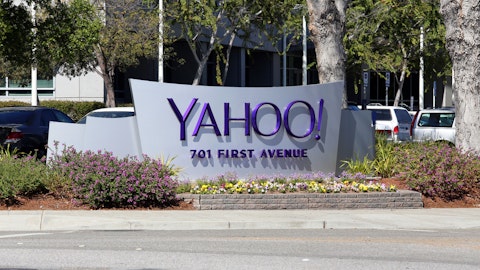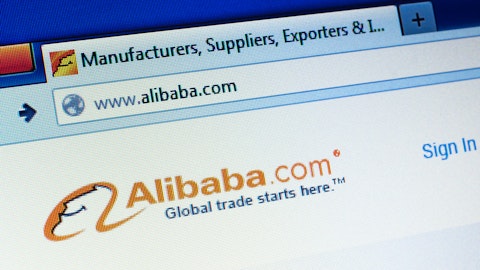Barron’s has recently published a rather controversial article on Alibaba Group Holding Ltd (NYSE:BABA). In the bearish piece, Barron’s Jonathan Laing wrote that Alibaba could fall by 50%, citing Alibaba’s forward PE of 25 versus eBay Inc (NASDAQ:EBAY)’s 15. Laing also questioned Alibaba’s financial claims, writing that Alibaba’s total number of users of 367 million and its average GMV per user of $1,215 per year did not make any sense given government estimates of China’s online shopping population and China’s low GDP per capita.

Gil C / Shutterstock.com
While poignant, there are some questions over the writer’s assumptions and Alibaba has also issued a response to the Barron’s claims.
In the column, Laing used a forward EPS of $2.56 per share instead of the consensus analyst 2016 EPS estimate of $3.37 per share. If Laing used the consensus EPS estimate, as Alibaba’s response has pointed out, BABA’s forward PE would be 20 instead of 25.
Laing does not give any credit to Alibaba’s future growth. Alibaba’s EPS grew an average of 100% per year for the last five years. Analysts estimate Alibaba’s EPS will grow 24% year over year over the next five years versus eBay Inc (NASDAQ:EBAY)’s 9.5% year-over-year appreciation. Faster growing companies deserve higher valuations. From a growth perspective, Alibaba is cheaper than eBay and its PE will eventually be lower than eBay Inc (NASDAQ:EBAY)’s if analyst predictions pan out.
Laing’s column questions Alibaba Group Holding Ltd (NYSE:BABA) ‘s numbers, hinting that Alibaba numbers aren’t correct. If Alibaba’s numbers aren’t correct, Alibaba should have high short interest. However, currently only 9.8% of Alibaba’s float, or 74 million shares, was short as of August 31, which is not a red flag. There are many other legitimate companies with comparable or larger short floats including Tesla Motors Inc (NASDAQ:TSLA), JD.Com Inc (ADR) (NASDAQ:JD), and Netflix, Inc. (NASDAQ:NFLX).
Furthermore, a who’s who of hedge funds: Soros Fund Management, Appaloosa Management, and Third Point, have all owned significant stakes in Alibaba at one point, although the funds have all sold out because of the large decline. Given that top hedge funds do exhaustive research, the hedge funds would never have invested in Alibaba if the numbers were so obviously incorrect. We mention the hedge fund activity concerning Alibaba because following hedge funds can generate alpha. Our research shows that the 15 most popular small-cap stocks among hedge funds have outperformed the market by nearly a percentage point per month between 1999 and 2012. We have been forward testing the performance of these stock picks since the end of August 2012, and they managed to return more than 118% over the ensuing three years and outperformed the S&P 500 Index by over 60 percentage points.
If Alibaba Group Holding Ltd (NYSE:BABA) numbers aren’t correct, JD.Com Inc (ADR) (NASDAQ:JD) numbers aren’t correct either. According to its second quarter results, JD.Com Inc (ADR) (NASDAQ:JD)’s GMV per active user run rate was $627 per year and growing rapidly. Although JD.com’s GMV run rate isn’t far off from Alibaba’s GMV run rate, the column doesn’t question JD.com’s numbers.
Alibaba’s user numbers are completely plausible. E-commerce is a winner-take-all field, where the leader gets the lion’s share of the market. Given Alibaba’s leading position, it makes perfect sense that Alibaba’s total active users would be similar to the total size of China’s online shopping population. Amazon.com, Inc. (NASDAQ:AMZN), for example, has over 270 million active accounts, of which two thirds are likely in the U.S. According to Statistica, 75.6% of the U.S.’s 279 million Internet users purchased an item online in 2015. That translates into 209 million total US e-commerce buyers versus Amazon’s 178 million US users.
Going with the tide is not always the right strategy. Barron’s was bearish on Facebook Inc (NASDAQ:FB) in 2012, calling for $15 per share when Facebook Inc (NASDAQ:FB) fell from $38 to $18. Facebook Inc (NASDAQ:FB) never went to $15 per share. It trades at $92 per share instead.
Disclosure: None





